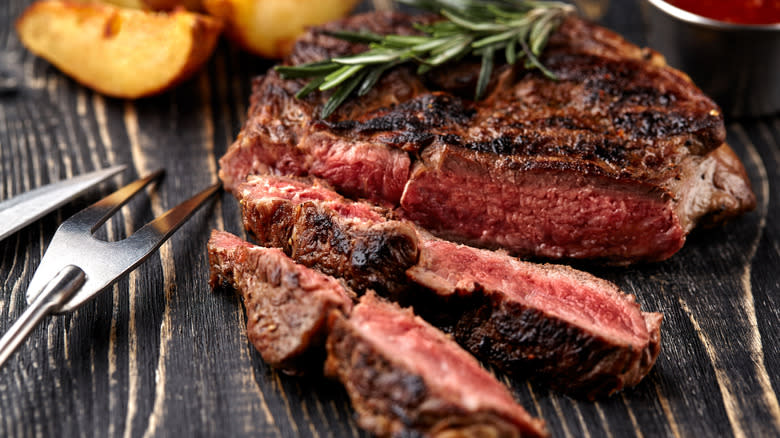Why Marinating Is The Best Method To Cook Tender, Select-Grade Beef

We all want to cook with the best ingredients possible, but sometimes because of budget or availability, you're stuck with something less than perfect, like select-grade beef. Now select-grade beef isn't bad — it can be downright delicious — but it's admittedly not on the level of the two beef grades above it: Prime and choice. Those grades are going to give you the juiciest, most flavorful steaks and roasts with minimal need to mess with the beef. However most supermarkets aren't selling prime-grade beef, and choice is going to be more expensive, so you end up with a few packages of the select stuff. If that's the case you can still produce a tender, flavorful meal with some marination.
Why marinating? The beef grades are primarily determined by the amount of fat marbling in your meat. Well-marbled beef means both more flavor and a juicer texture, and since select is the lowest grade it is going to be the most dry. It can still be tender with plenty of flavor, but you need something to prevent it from drying out, especially if you use dry-heat methods like grilling or searing. Some cooking methods like a reverse sear can help with that, but the most sure-fire way to ensure a juicy piece of select beef is through a marinade.
Read more: 8 Absolute Best Cuts Of Meat To Deep Fry
The Salt And Acid In Marinades Help Select-Grade Beef Stay Juicy

Salt and acid (in the form of citrus juice or vinegar) are two key components of marinades that tenderize the meat and help retain moisture. Salt in your marinade helps through a process called brining, where salt molecules penetrate into the interior of your beef through osmosis. While this first and foremost helps flavor the interior of the meat, it also helps it retain moisture because the salt will break down muscle proteins. This means meat fibers can't contract as much when they cook, so they squeeze out less moisture. Acids help to change the shape of meat proteins, not break them down, and this transformation exposes cells that increase their ability to retain moisture. Combine the two in a marinade and even the leanest cut of select-grade beef will retain a lot of its juice.
Your marinade doesn't need to be complicated to get this tenderizing effect. A simple steak marinade with soy sauce, lemon juice, and vinegar will work wonders. Don't add too much acid, as going overboard can cause beef to get mushy. The only other thing to make sure of when marinating select beef is that you do it long enough. The most noticeable effects come after at least four hours, and the best versions take eight or more. With those few simple marinating tricks your select-grade beef will be nearly as good as a high-quality cut.
Read the original article on Tasting Table

 Yahoo Lifestyle
Yahoo Lifestyle 
